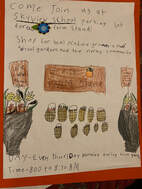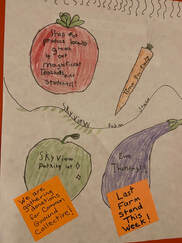Garden Sciences
Why School Gardens?

As young people of the 21st century face their future, some of the most significant national and global issues they will encounter include water availability, climate change, public health, human migration, genetics and bio-engineering, social and environmental justice, and food security. Each of these issues connects, in some way, to food systems and agricultural practices. Students who are introduced slowly, over time, to the complexities and interconnectedness of these systems will be more equipped to be future leaders who are prepared to make challenging decisions and build innovative and restorative paths forward.
In response to this, school gardens have entered the national spotlight as an impactful way to enhance student education through practical, hands-on, real world learning. The most successful school garden programs are deliberately integrated into the academic structure of the school and are valued as a highly effective tool for teaching required curriculum.
At Skyview, our school gardens support the school’s multiple intelligence approach to learning by emphasizing the naturalist intelligence, as well as enhancing the school’s thematic, project-based pedagogy.
In response to this, school gardens have entered the national spotlight as an impactful way to enhance student education through practical, hands-on, real world learning. The most successful school garden programs are deliberately integrated into the academic structure of the school and are valued as a highly effective tool for teaching required curriculum.
At Skyview, our school gardens support the school’s multiple intelligence approach to learning by emphasizing the naturalist intelligence, as well as enhancing the school’s thematic, project-based pedagogy.
Benefits of Garden Based Learning

- School gardens provide opportunities for active learning, inquiry, observation, and experimentation across the curriculum.
- School gardens advance place-based and culturally responsive instructional practices by enlisting local communities and ecologies as resources.
- Garden-based teaching promotes healthy living habits by motivating kids to eat and appreciate fruits and vegetables, increase their physical activity, and enjoy quality outdoor experiences.
- Gardening connects students to the natural world, inspires stewardship, and helps students develop empathy for animals, insects, plants, and people.
- The garden provides robust opportunities for learning academic standards and required curriculum in core content areas.
Math (numbers and operations, algebraic thinking, geometry, measurement, data analysis, problem solving, proof and reasoning, representation, mapping and graphing
History and Social Studies (people and eras, historical events, study of important historical figures and innovations, regional and cultural connections, economics, food systems, social and environmental justice)
English Language Arts (listening and speaking, communication skills, narrative and expository writing, journaling, poetry, literary symbols, articles and journalism, stories, myths, and legends)



